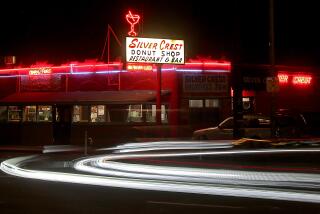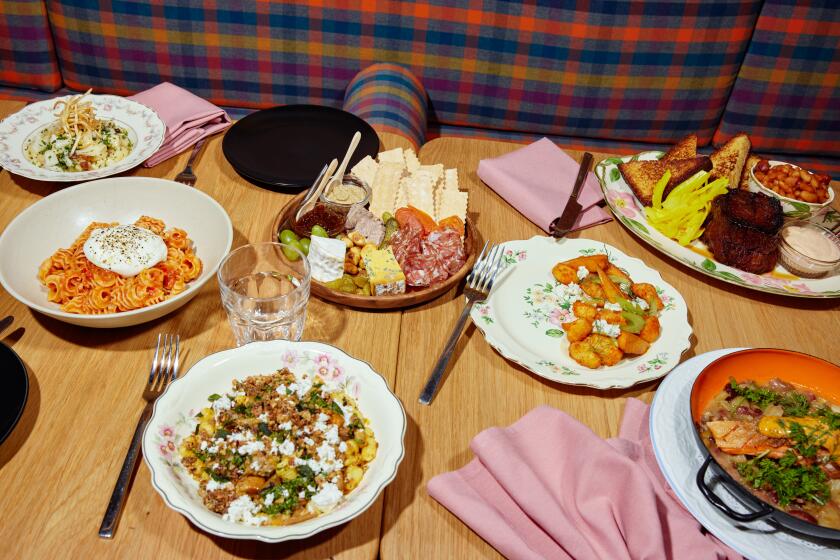Good Eats, Sharp Tongue : Maggie Speaks, the Boys Listen
- Share via
Each day at 6 a.m., Magda Jankovich springs from a skinny bed in the storage room of her bar and restaurant, a friendly outpost along a lonely stretch of backcountry road in the northeast corner of San Diego County.
Before brewing the morning’s first pot of coffee, she creeps into a back-yard cottage to awaken Roman Campbell, an 18-year-old orphan she has taken under her wing, taught the value of a dollar and recently persuaded to return to high school.
A half an hour later, even before the lazy winter sun has climbed over the horizon, her griddle is sizzling and a pot of her spicy goulash is already simmering on the big kitchen stove.
Perched on a nearby counter stool--decked out in a colorful print dress and one of the 30 elaborate hats from her collection--the bright-eyed Hungarian immigrant peers at magazines and junk mail through bifocal lenses, using two huge dictionaries to locate the words she doesn’t know, patiently awaiting her first customer of the day.
Maggie’s Place, that rural institution along California 79 known to regulars as an “oasis in the middle of the desert,” is open for business.
Said one local: “Maggie’s is kind of like the last stop you make before you go anyplace to get somewhere else.”
Today, like every other day, the specials are Maggie’s famous goulash, spiced with paprika and onions. And her cabbage rolls. And what the locals call the best pizza this side of Chicago.
But this is isolated territory, dry and tortured turf tucked behind towering Palomar Mountain, miles from the nearest six-lane freeway and well-trodden truck stops. Customers out here are about as predictable as a summer storm.
Whether they arrive by horseback, motorcycle, backwoods clunker or gun-rack-studded pickup truck, Maggie’s country customers roll in off the road like famished tumbleweeds--sometimes alone, other times all at once.
And some of them even sport the bumper sticker Maggie sells at the bar for a dollar, the one that reads, “Where’n the HELL is Maggie’s Place?”
“There’s days where I sit here all morning, and no one comes in,” the 57-year-old woman says in a sweet, lilting voice. “But I just wait it out. And, when they do come, sometimes it’s in one big herd.”
One day, Maggie recalls, the lunchtime rush filled her 12 counter stools and all five tables.
“But I handled them all,” she said. “I waited on every one of them. And, when I was through, they all clapped.”
Since 1984, Maggie’s Place has opened its doors for the hungry, lost and lonely travelers passing through Dodge Valley, an expansive spread of undeveloped ranchland just a coyote’s howl south of the Riverside County line.
Seven days a week, sometimes 20 hours a day, Maggie is there to greet them, wiping her hands on a soiled apron--working not only as sole owner, but also as waitress, cook, dishwasher, bartender and yes, even bouncer.
A political dissident who fled her homeland during the 1956 Hungarian Revolution with her husband Laszlo, Maggie knows the value of hard work.
The couple spent 20 years carving out an existence of piecemeal jobs throughout the Midwest--picking fruit and selling odds and ends door-to-door--before Laszlo’s death near St. Louis in 1976.
Now Maggie sleeps in a storage room of her restaurant, amid stacked cases of warm beer. For her, this place is home. She starts each day early--and ends it late--as though it will be her last chance to serve her beloved regulars.
But Maggie’s story could well have ended five years ago, back when she and her two sons ran Mom and Pop’s diner, another restaurant about a dozen miles down the road in Radec. The owner decided not to renew their lease.
That’s when Homer Harris, a nearby rancher, came to her rescue. He loaned Maggie nearly $100,000 to buy the shell of an old restaurant up the road. With characteristic zeal, she moved into the new place, spread water buckets beneath leaky spots in the roof, and used a broom to shoo away the snakes.
Months later, after refurbishing the kitchen, rebuilding the roof and applying a fresh coat of paint, she reopened for business. This time, the venture was simply called Maggie’s Place.
“If there’s one thing I respect about that woman,” said Harris, explaining why he lent so much cash to a virtual stranger, “it’s that she’s willing to do hard work every day.
“People relate to her tenacity to open that business and stay on her feet 12 hours a day. And she’s not offended when the locals act up and start their swearing contests. She knows how to handle them.”
Today, Maggie is once again leasing the other restaurant in Radec. But she has hired a manager to take care of business there. These days, her attentions are focused at home, at Maggie’s Place.
“You put your time in,” she says. “And you work, work, work, work, work--most times by yourself. That’s how you get ahead.”
The business sits along the old stagecoach route between San Diego and Northern California, locals say. And, although times have changed since the last horse-drawn coach rumbled through here nearly a century ago, some pretty rough customers still walk through her doors.
But Maggie’s a tough customer herself. With a robust, frontier spirit that even the roughest-edged regulars have come to respect, she lays down the law in Maggie’s Place.
And beware to the greenhorn customer who says something to catch her fancy. That’s when Maggie lets loose a patented belly laugh that sends some regulars reaching for their ears, protecting themselves from a sound that’s been described as a cross between a fire siren, whooping crane and a laughing hyena gasping for air.
“HEEEE . . . HEEEE . . . HEEEE . . . HEEEE . . . HEEEE,” goes Maggie’s cackle.
“Oh yeah,” says Harris, now one of Maggie’s closest friends. “That laugh can get to you. And, who knows what’s going to set it off?”
That laugh, along with her stubborn will to survive in these financial wilds, has some of Maggie’s other customers shaking their heads as well.
“A normal business person would probably get burned out in a place like this real quick,” said one regular known as Pat the bartender.
“The back hills out here are a kind of refuge for all kinds of humanity and fly-by-night hillbillies. It’s tough territory, but Maggie is as tough as the land. She’s a character herself, and she knows how to take care of the clowns and drunks and big old biker monsters who stumble into this place.
“To quote Maggie, ‘I ain’t afraid of no man.’ And she means it.”
Richard Weidmann, whose wide-brimmed cowboy hat shades his graying beard, sees Maggie’s tough-gal stubbornness as first-class entertainment.
“This is man’s territory, filled with proud people who won’t back down to anyone,” he said. “So it’s a joy to see Maggie in the face of some tough guy, watching him suddenly kick back.
“You laugh, wondering whether he’s going to get up and leave. You watch to see how he’s going to keep his composure.”
Maggie has established a few rules for the house. No fighting. No gambling at the pool table. And no stepping behind the bar or kitchen counter, period.
One day, Weidmann broke one of those rules.
“Once I stepped behind the bar to empty an ashtray,” he recalled. “Well, she was in my face for 10 minutes right in front of everybody, saying that nobody goes behind her bar.
“She made me feel real small. But it worked. Now I respect her turf.”
The way Maggie sees it, anyone who doesn’t respect her restaurant, doesn’t respect Maggie. And that means trouble.
When two brothers recently started a fight over a pool game, Maggie flew into action. Usually, she keeps the bar open until legal closing time or everyone has had enough fun, whichever comes first.
Not this night, though.
“I picked up the cue ball from the table and shut off the lights,” she said. “I told the people at the bar they could all go home, every last one of them, because they had ruined that night. The way I see it, if they can’t get along without acting like small children, it’s time to go.”
Although they respect her spunk, many locals wonder just how well Maggie sleeps at night. In recent years, the foothills east of Palomar Mountain have become home to drug peddlers who run their illegal methamphetamine labs and bad-news burglars who cruise the backcountry, they say.
“This is a dangerous place sometimes,” said Weidmann, who has been burglarized several times in the past year and recently lost his gun and knife collection to thieves.
“There’s druggies and thieves and crazies. For a woman to be around here alone at night, it’s something to be worried about.”
But Maggie refuses to flinch--despite two recent attempted break-ins, one by a man who shattered her window in the middle of the night.
“I yelled out, ‘What on earth are you doing?’ By the time I put my robe on, he had run to his car and drove off. So you see, I’m not scared. He’s the one who is scared.”
She called the sheriff, who came out several days later. Way out here, Maggie says, she often is forced to fend for herself.
Some outlaw types have made her a more skeptical businesswoman. Not long ago, several off-duty Marines carried some liquor, cigarettes and several cases of beer out the back door of her bar, she said. Now she keeps the door locked.
But true to her style, Maggie writes off the theft as an isolated incident. She even makes an off-handed joke about it. And she brays her Maggie laugh.
“HEEEE . . . HEEEE . . . HEEEE . . . HEEEE . . . HEEEE,” goes Maggie.
She says she doesn’t recall where she learned to laugh like that. But during a recent trip back home to Hungary, her 81-year-old uncle told Maggie what he missed most about her was that laugh.
“So I laughed a lot,” she said.
That’s all part of the softer side to Maggie’s style, locals say. In the backcountry where banks and post offices are few and far between, she offers credit, cashes checks and accepts mail and phone calls for many regular customers.
At night, she has swiped the car keys of more than one buckaroo who has boozed it up past his limit, phoning a friend to come haul him home. Recently, one drunk cowboy even slept off the night’s damage at Maggie’s back-yard cottage.
Regulars have even met and married at the bar. Maggie and the women throw out a spread of champagne and Hungarian home cooking while the boys drink beer and whiskey, shoot pool and listen to country-and-Western tunes on the jukebox.
And Maggie has a thing for strays. So far, she has taken in three dogs--Gypsy Star, Snow and Hymie--who lounge away most afternoons on her front porch and, sometimes, under her counter.
“I’ve been in bad moods and then come in here and see Maggie happy,” Weidmann said. “Bad things have happened to her and she laughs them off. And so, I tell myself, ‘Why am I so cranky? Just look at Maggie!’ ”
Roman Campbell knows firsthand about Maggie’s generosity. For more than a year, the former orphan has lived with Maggie while he attends high school in Julian and works nights in her restaurant kitchen.
Campbell said he asked the widow for a job last year and she consented--on the condition that he drop the crowd that he had been hanging out with. It’s worked out for both of them, he said; and, as he spoke, Maggie stood behind the counter, peering through her bifocals, her face aglow.
“She treats me like a son,” he said. “She’s taught me about responsibility and managing my money. I guess she’s like a mother to just about everyone in here.”
One day, Maggie says, Roman might even take over the restaurant when she retires. Until then, though, Maggie’s word is still law around these parts.
“I don’t get lonely,” she says. “I work all day. And, when I go to bed, I’m ready to put my head down and go to sleep. I’ve got no time to be lonely.”
Then she stops and throws her head back.
“HEEEE . . . HEEEE . . . HEEEE . . . HEEEE . . . HEEEE,” goes Maggie.
More to Read
Eat your way across L.A.
Get our weekly Tasting Notes newsletter for reviews, news and more.
You may occasionally receive promotional content from the Los Angeles Times.











